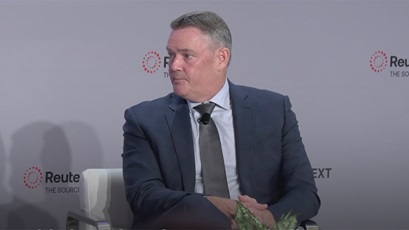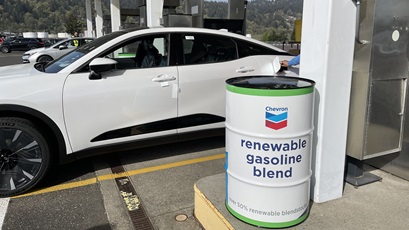emissions solutions
ACES hydrogen project to advance lower carbon future
1 min read | july 03, 2024
The Advanced Clean Energy Storage (ACES) Project will use an electrolyzer like this one to convert renewable resources, such as wind and solar, into hydrogen and then store that hydrogen for later use.
“I believe the Advanced Clean Energy Storage Project is groundbreaking and will demonstrate hydrogen’s potential at scale.”
That’s Prerna Jain’s take on the hydrogen storage project, also known as ACES. The ACES Project will convert renewable energy to hydrogen and then store it for later use.
Jain is Chevron’s integration and growth manager for the effort.
why it matters
Hydrogen will be key to the U.S. energy future. It is expected to be 12% of the global energy mix by 2050. It can help increase the use and availability of lower carbon energy.
Chevron is responding to the demand for lower carbon intensity hydrogen. Austin Knight, Chevron’s vice president of Hydrogen, recently chaired the coordinating subcommittee for the National Petroleum Council’s report “Harnessing Hydrogen: A Key Element of the U.S. Energy Future”.
“This project helps meet the need for dispatchable lower carbon power generation,” he said. “In Delta, Utah, where the project is situated, salt caverns will allow for seasonal energy storage. ACES Delta is near regional renewable power sources, transmission and distribution infrastructure, and demand markets. We are optimistic it will support U.S. climate goals by providing hydrogen as an alternative to higher carbon intensity fuel options.”
prerna jain
ACES integration and growth manager
more on that
The ACES hydrogen project is expected to begin commercial operation in 2025. It will supply hydrogen to the Intermountain Power Agency for its IPP Renewed Project, which aims to transition to lower carbon power generation.
Storing hydrogen at the site allows it to be dispatched as needed. This, in turn, allows for a higher use of renewables in the energy mix. The first project could generate up to 100 metric tonnes of hydrogen per day that will be stored in salt caverns.
“Chevron is bringing its expertise in project execution; safe, reliable operations; and building large energy value chains to ACES,” Jain said. “We are learning a lot from executing the first project at ACES—this experience sets us up with a competitive advantage as we develop other lower carbon hydrogen opportunities.”
topics covered
related content
-

 novel ideas, established companies key to advancing lower carbon tech
novel ideas, established companies key to advancing lower carbon techemissions solutionsjanuary 14, 2025
-

 chevron CEO talks growing production, efficient spending
chevron CEO talks growing production, efficient spendingemissions solutionsdecember 18, 2024
-

 1st US hydrogen-powered passenger ferry open for business
1st US hydrogen-powered passenger ferry open for businessalternative fuelsaugust 23, 2024
-

 toyota and chevron drive progress with renewable gasoline blend
toyota and chevron drive progress with renewable gasoline blendalternative fuelsjuly 18, 2024
chevron email updates
Subscribe to our newsletter to receive news and updates.



